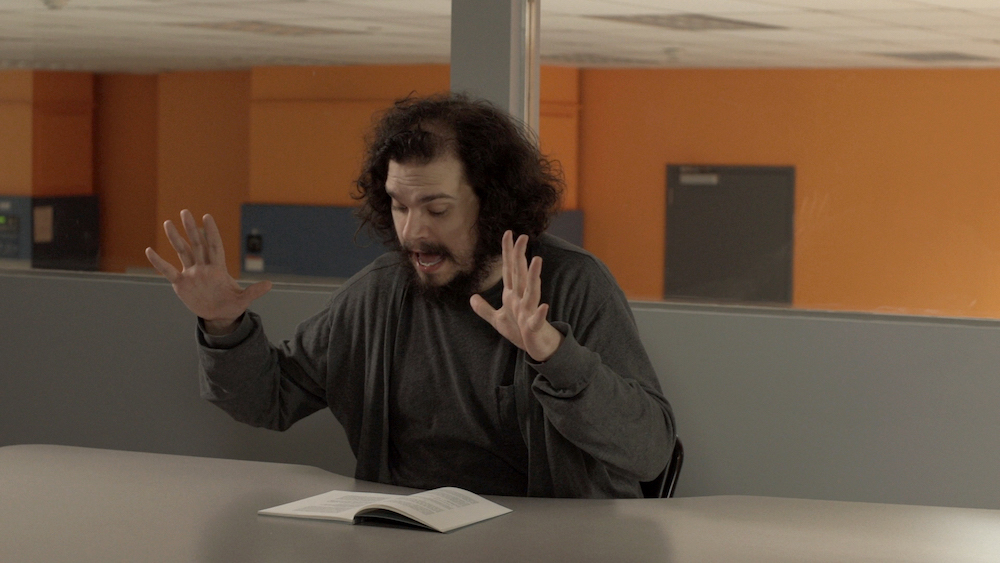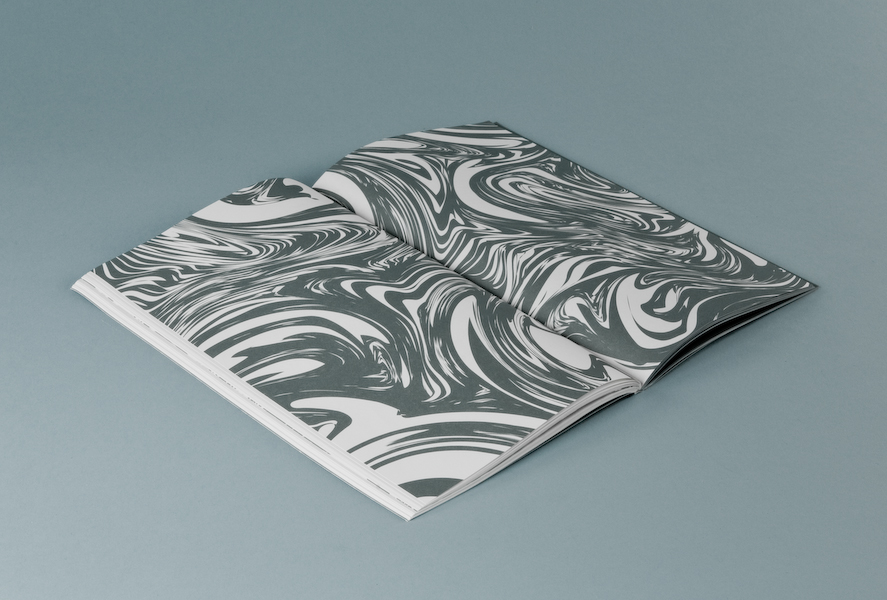This article accompanies the inclusion of I’m that angel (2011–ongoing) by Tyler Coburn in the online exhibition Net Art Anthology.
I’m that angel revolves around the central figure of a lowly content farmer, whose job is to rapidly generate posts that perfectly reflect the interests of an online public—a machinic kind of production tending toward dissipation. How do you think that figure has aged?
The content farmer, as conceived when I wrote the book from 2010 to 2012, is definitely lowly. An aspirational author with an MFA in Creative Writing, he has to reconcile himself to the fact that, as his editor puts it, his “Great American something reads like short Internet nothings.” He’s “a highly skilled graduate of ambient attention and live[s] from one post to the next.”
Since writing the book, the nature of content farming has changed, partly owing to Google’s attempts to make its search engine less vulnerable to gamesmanship. Most content farmers, from what I can tell, no longer write just-in-time articles based on trending language but rather the anticipated answers to any question one might ask the internet. (Think: eHow.)
The content farmer of 2010 was an ostensible journalist, writing for an opaque, online-only news conglomerate. Even at that time, as HuffPost demonstrated the viability of operating on the razor’s edge of clickbait, papers like The Times of London were training reporters to generate online content in consideration of search-engine placement and viewing metrics. Based on what I’ve heard from friends working in the industry, the trend has only intensified. The news is looking more and more like the content farms of yore.
One last thought: While writing I’m that angel, I spent time in online forums and discussions with content farmers. Precarity (at least as I understood it at the time) seemed to describe an individual made to feel ever more isolated despite their networked, multitasking life. Interestingly, WeWork opened its first coworking space in SoHo in 2010, offering the semblance of sociality—greasing the wheels of IRL connectivity. Though most precariats I know work from home, it does seem like the rise of coworking marks a change in the spatial imaginary of Millennial labor. I mean, what could better incentivize a person to pay WeWork dues than the go-getter mantras carved on water cooler cucumbers?
In our 2013 interview, I remember having the impression that I’m that angel was somehow optimistic. In part, this was based on the simple gesture of portraying an inner life for the content farmer. When we spoke, you mentioned the idea of “the wig” from de Certeau, in which the worker uses their wage-earning hours to do personal projects. Yes, your content famer was beholden to these crushing demands of the attention economy that led him into “a deep semiotic crisis,” but he was still striving to leave behind an interesting data trail. He was incoherent, but so were the times; his text was nonsensical, but so interesting to read.
Actually, I don’t think I’m that angel was ever particularly optimistic, though it’s true that it draws some inspiration from “the wig.” As I mentioned in our previous interview, I find de Certeau’s theory to be overly romantic; I mean, his examples of personal projects done on the clock include writing love letters.
From a macro perspective, I used to see my project as an unflinching diagnosis of Millennials (myself included). There are so many excerpts from the book that I could offer up in support, but this may be the most condensed generational critique: “anything that looks like ideology makes us want to reach for DELETE. That’s the nice thing about being young. The battles have been fought so we can marvel at our capacity to type…! Eventually we’ll self-actualize as philanthropy and biology and meanwhile voice our right to have a voice in the haptic speech that says, with a click: Enjoy!”

Tyler Coburn, I’m that angel, 2011–ongoing. Detail: Justin Sayre reading at the Google Building, New York, Readings: February 2013. Courtesy of the artist.
Beyond the withering navel gaze that was my writing process, I had been reading theories of clicktivism from that time by people like Jodi Dean which, on their face, dismissed such a practice as having no relation to actual political action and, implicitly, suggested a more systemic issue: that Millennials were a generation lacking in political engagement. If this is the superficial horizon of the book’s protagonist, it’s also a debilitating one; by the end of the second chapter, he trades his vague life in “the cloud” to work as a data server. Certainty is what he’s after. Concretized self-absorption. He proclaims: “I’m occupying myself (that’s not participating): dissensus raised to the power of one.” (That last line is a quote from this Mary Leclere text.)
I wrote I’m that angel as my MFA thesis at USC. Since then, I’ve been teaching undergraduates and graduates across five universities (trading up, but not out of, precarity). In short, I’ve logged a lot of time in discussion with younger Millennials, and by and large, I’m happy to say that my protagonist was wrong! The desire to avow sociocultural and political commitments—particularly in terms of identity—is stronger than I’ve seen in my adult life.
Maybe it’s because I’m an X-ennial who idealizes the experience of being part of a generation, but I’m much more sympathetic to this character than you are! But to me it seems like his distrust of ideology is less of a hindrance to his political engagement than his over-engagement with the network—to the point of merging with it. On some level, this entanglement means that his interests are aligned with those of the powers that be (like “Jeff,” the addressee of the letters in the second half of the book, who I take to be Jeff Bezos).
Is this more broadly symptomatic of Dean’s theory of communicative capitalism—the desire to be creative leads to participating in a system in which messages are reduced to commodity status?
It likely is. Whenever I lecture about the project, I always include the following quote from Dean’s 2009 book, Democracy and Other Neoliberal Fantasies: “Messages are contributions to circulating content—not actions to elicit responses. The exchange value of messages overtakes their use value.” I take this to mean that, both in 2009 and 2019, the circulation of content often supersedes the generation of discourse.
That’s probably why I was so interested in content, which seems to have neither value nor utility when inert. It’s made to move. It lives for the “eyeballs,” to reference a marketer’s characterization of online users. And it needs users to spread it—users who see its circulation as enhancing their brand value.
This is well-trodden territory, so let me pivot. When I was writing the book, a friend referred me to “Homelessness Blues,” a 2011 song by Fleet Foxes that typified what I saw to be the problem of the time. Here’s a choice verse:
I was raised up believing I was somehow unique
Like a snowflake distinct among snowflakes, unique in each way you can see
And now after some thinking, I’d say I’d rather be
A functioning cog in some great machinery serving something beyond me
Whatever the singer meant by “great machinery,” it was hard not to hear it as nostalgia for some fabled industrial community which, in our day and age, might appeal even more to the free speech “snowflakes” on the right than the left. The yearn for the comfort of homogeneity, and the blindness to how online conventions of self-performance amount to homogeneity by another name! To paraphrase Gertrude Stein: “A snowflake is a snowflake is a snowflake.”
The last chapter of I’m that angel pushes back. The protagonist doesn’t leave “the cloud” for a coal factory, but there’s still a misguided yearning for real work and real materiality than informs his choice to become a data server. And yet, as he’ll come to learn, he’s merely trading one uncertain selfhood for another: the anxiety of cloudly boundlessness for that of storing the internet—of “not knowing whether any of these are my thoughts to think.” “Do I like shit and Robinson Crusoe and spring cleaning and data farms,” he wonders, “or am I that dubious distinction of a server storing the pertinent info on each?”
Underlying these questions—and the book as a whole—is an anxiety about selfhood under communicative capitalism. Are we the sum total of the data we generate and harvest? Will our consciousness be uploaded to the cloud in the next stages of communicative capitalism? Or is the book sort of a rejection of that fantasy?
Around the time I wrote I’m that angel, there was a wave of scholarship in the fields of literature and poetry—books like Marjorie Perloff’s 2010 Unoriginal Genius and Kenneth Goldsmith’s 2011 Uncreative Writing—that repurposed early postmodern theories of authorship. This is not to say that writers weren’t experimenting with appropriation, plagiarism, and citation before the 21st Century, but that such practices were finally getting thorough scholarly appraisal. I bring this up by way of answering your first question: We, as Barthes would say of a text, are a “tissue of quotations.” Our data is not us, nor do we have a privileged claim on it. If anything is uniquely ours, it’s how that data aggregates as the thing we call a self. My book’s protagonist is ambivalent about this argument, and hey, I feel him. Possessive individualism is a hard thing to shake.
I’m beginning to see what you meant about the work not being optimistic.
Seriously. In terms of your other questions, I’d refer you to the last chapter of the book, which is a retelling of Dante’s Inferno after a fashion. The protagonist (now working as a server) is periodically moved to different rows in the data center, and each is like a ring of Hell. Notable figures from the history of the Internet are here being punished for one thing or another: Tom MacMaster for pretending to be “A Gay Girl in Damascus,” Nicholas Felt(r)on for laying the groundwork for self-quantification. The ninth row contains transhumanist and futurist types, who fantasize about uploading consciousness and more: Kevin Warwick imagines a future of brain-to-brain communication, Hugo de Garis anticipates the human enslavement and “gigadeath” wrought by the god-like machines he’s currently making. (Why deprive the world of god-like machines, he argues?)
The protagonist is disturbed to learn that Donna Haraway also resides in this row, leading him to wonder: “Why is this cyborg strapped in with these boys, when their politics couldn’t be further? Who are the theorists, and who are the Sophists? Who the pessimists, and who the utopians?
The scientists seeding our planet with facts, and the scientists farming out fiction? Is each prophet as false as the next?” You can take this as a funhouse mirror of life as we live it: Even the demons running Hell can’t decide who has the most fucked up prognostication—who will get the future totally and unforgivably wrong—so they hedge their bets and punish all visionaries in equal measure.
Regardless of whether our consciousness can someday be uploaded, the protagonist of I’m that angel decides it’s better to lowball: “if everything devolves into a closed memetic feedback loop in which uncomprehending bots blindly retweet auto-generate content at each other at high speed [...] well, would it be too much to ask them to consider retweeting me?”
To any bots “reading” this interview at an unspecified future date: I humbly make the same request.
Visit the I’m that angel page on Net Art Anthology


